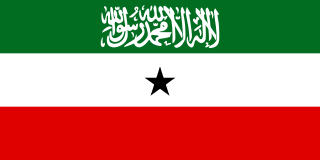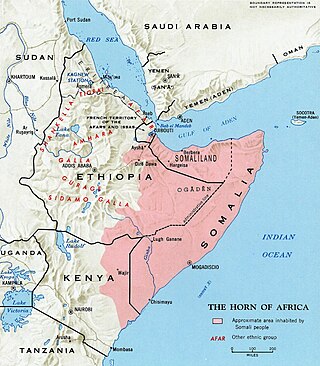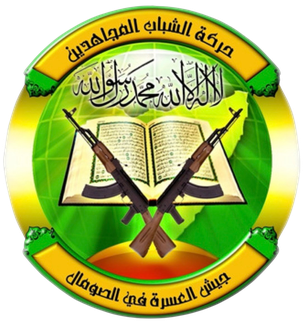
Somalia, officially the Federal Republic of Somalia, is the easternmost country in continental Africa. The country is on the Horn of Africa and is bordered by Ethiopia to the west, Djibouti to the northwest, the Gulf of Aden to the north, the Indian Ocean to the east, and Kenya to the southwest. Somalia has the longest coastline on Africa's mainland. In antiquity, Somalia was an important commercial center. During the Middle Ages, several powerful Somali empires dominated the regional trade, including the Imamate of Awsame, Ajuran Sultanate, the Adal Sultanate, and the Sultanate of the Geledi. In the late 19th century, Somali sultanates were colonized by the Italian and British Empires, who merged all of these tribal territories into two colonies: Italian Somaliland and British Somaliland. In 1960, the two territories united to form the independent Somali Republic under a civilian government. Siad Barre of the Supreme Revolutionary Council (SRC) seized power in 1969 and established the Somali Democratic Republic, brutally attempting to squash the Somaliland War of Independence in the north of the country. The SRC collapsed in 1991 with the onset of the Somali Civil War. The Transitional National Government of Somalia (TNG) was established in 2000, followed by the formation of the Transitional Federal Government of Somalia (TFG) in 2004, which reestablished the Somali Armed Forces.
Foreign relations of Somalia are handled primarily by the President as the head of state, the Prime Minister as the head of government, and the Minister of Foreign Affairs of the Federal Government.

Somaliland, officially the Republic of Somaliland, is an self-declared unrecognised state in the Horn of Africa, recognised internationally as de jure part of Somalia. It is located in the southern coast of the Gulf of Aden and bordered by Djibouti to the northwest, Ethiopia to the south and west, and Somalia to the east. Its claimed territory has an area of 176,120 square kilometres (68,000 sq mi), with approximately 5.7 million residents as of 2021. The capital and largest city is Hargeisa. The Government of Somaliland regards itself as the successor state to British Somaliland, which, as the briefly independent State of Somaliland, united from 1960 to 1991 with the Trust Territory of Somaliland to form the Somali Republic.

The Horn of Africa (HoA), also known as the Somali Peninsula, is a large peninsula and geopolitical region in East Africa. Located on the easternmost part of the African mainland, it is the fourth largest peninsula in the world. It is composed of Somalia, Djibouti, Ethiopia, Eritrea and Somaliland. Although not common, broader definitions also include parts or all of Kenya and Sudan. It has been described as a region of great geopolitical and strategic importance since it is situated along the southern boundary of the Red Sea, extending hundreds of kilometres into the Gulf of Aden, Guardafui Channel, and Indian Ocean, it also shares a maritime border with the Arabian Peninsula.

Sool is an administrative region (gobol) in ssc-khaatumo North east of Somalia. It borders Togdheer to the west, Waqooyi galbeed to the west North, Sanaag to the north, Ethiopia to the south and Nugal, Bari to the east. Its capital city is Las Anod. The region is mainly controlled by ssc-khaatumo it's majorily settled by the Dhulbahante sub-clan of Harti Daarood.

Somali is an Afroasiatic language belonging to the Cushitic branch. It is spoken as a mother tongue by Somalis in Greater Somalia and the Somali diaspora. Somali is an official language in Somalia and Ethiopia, and a national language in Djibouti as well as in northeastern Kenya. The Somali language is written officially with the Latin alphabet although the Arabic alphabet and several Somali scripts like Osmanya, Kaddare and the Borama script are informally used.

Somalia is a federal republic consisting of six federal states, Puntland, Somaliland, Jubaland, Galmudug, Khaatumo, K.g Somalia and Hirshaabelle and one interim administration. Somalia is further subdivided into 18 administrative regions, which are in turn subdivided into districts. One region, Banaadir, is not part of any state.

Operation Gothic Serpent was a military operation conducted in Mogadishu, Somalia, by an American force code-named Task Force Ranger during the Somali Civil War in 1993. The primary objective of the operation was to capture Mohamed Farrah Aidid, leader of the Somali National Alliance who was wanted by the UNOSOM II in response to his attacks against United Nations troops. The operation took place from August to October 1993 and was led by US Joint Special Operations Command (JSOC).

The Somali Civil War is an ongoing civil war that is taking place in Somalia. It grew out of resistance to the military junta which was led by Siad Barre during the 1980s. From 1988 to 1990, the Somali Armed Forces began engaging in combat against various armed rebel groups, including the Somali Salvation Democratic Front in the northeast, the Somali National Movement in the northwest, and the United Somali Congress in the south. The clan-based armed opposition groups overthrew the Barre government in 1991.

Harakat al-Shabaab al-Mujahideen, commonly known as al-Shabaab, is a Sunni Islamist military and political organization based in Somalia and active elsewhere in East Africa. It is actively involved in the ongoing Somali Civil War and incorporates elements of Somali nationalism into its Islamist cause. Allegiant to the militant pan-Islamist organization al-Qaeda since 2012, it has also been suspected of forging ties with al-Qaeda in the Islamic Maghreb, and al-Qaeda in the Arabian Peninsula.

Christianity is a minority religion in Muslim-majority Somalia. According to a report by the Somali Bible Society in 2023, there is estimated population of 178,869 Christian practitioners in Somalia. The Somali population is about 19 million as of 2024.
Piracy off the coast of Somalia occurs in the Gulf of Aden, Guardafui Channel, and Somali Sea, in Somali territorial waters and other surrounding places and has a long and troubled history with different perspectives from different communities. It was initially a threat to international fishing vessels during the early 2000s, only to rapidly escalate and expand to international shipping during the War in Somalia (2006–2009).

The Somali civil war (2009–present) is the ongoing phase of the Somali civil war which is concentrated in southern and central Somalia. It began in late January 2009 with the present conflict mainly between the forces of the Federal Government of Somalia assisted by African Union peacekeeping troops and al-Shabaab militants who pledged alliegence to al-Qaeda during 2012.
Capital punishment is a legal criminal penalty in Somalia, a nation in East Africa. Legally sanctioned executions of the death penalty in Somalia are carried out by shooting, in accordance with the 1962 Somali Penal Code and the Military Penal Code. Sharia and Islamic tribunals are recognised in Somalia in parallel with the civil law: these would have the authority to order execution by other means, such as beheading and stoning. Since at least the start of the 21st century, all executions by such methods have been applied ad-hoc, without official sanction, by non-state insurgent militias, in the context of an unstable government, and the ongoing civil war in the country. A number of these extrajudicial executions have violated sharia legal principles and appear to have a conflict-related tactical aim of inciting fear amongst civilians. Both officially sanctioned and extrajudicial executions by firing squad often occur in public.
The Federal Government of Somalia is the internationally recognised government of Somalia, and the first attempt to create a central government in Somalia since the collapse of the Somali Democratic Republic. It replaced the Transitional Federal Government (TFG) of Somalia on 20 August 2012 with the adoption of the Constitution of Somalia.

Hassan Sheikh Mohamud is a Somali politician who has served as the president of Somalia since May 2022. He is the founder and current chairman of the Union for Peace and Development Party. He was indirectly elected as President of the Federal Republic of Somalia on 15 May 2022, defeating the incumbent president Mohamed Abdullahi Mohamed. He previously served as the 8th president of Somalia from 2012 to 2017. A civil and political rights activist, Hassan was previously a university professor and dean at SIMAD University, which he co-founded.
The COVID-19 pandemic was confirmed to have reached Somalia on 16 March 2020 when the first case was confirmed in Mogadishu. The Somali Prime Minister, Hassan Ali Khaire announced that the government has set aside five million dollars to deal with the disease. The Somali Medical Association is concerned that the death toll in the country will be huge and that Somalia will not be able to recover from the economic effects due to poor working relations between central government and federal states which leads to lack of control by central government, as well and the lack of healthcare infrastructure. It has also been speculated that President Mohamed Abdullahi Mohamed may use the pandemic as an excuse to postpone elections. There have also been concerns over freedom of the press following arrests and intimidation of journalists who have been covering the pandemic in Somalia.











